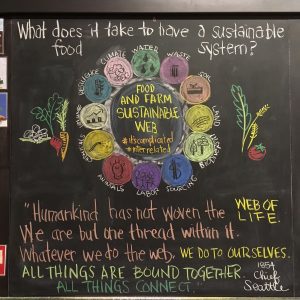Mindful Menus: The Northwest School Serves Up Their Values
“We ultimately recognize that we are operating in an imperfect system. We often have to make difficult purchasing decisions based on budget, time, availability, seasonality, customer demands and staffing. Evaluating the role of meat in the dining program is complex because there is a high demand for it, but it comes with a higher cost and environmental impact than plant-based items. And yet, we ask ourselves hard questions all the time because if we don’t, we may miss opportunities. We challenge ourselves to push the boundaries in order to change our narrative, hold ourselves accountable to our values, and hopefully influence the system for the better.”
– Bethany Fong, Director of Food Services, The Northwest School
Over the past few years, more and more institutions have made the connection: our food choices impact our health, the environment, and the lives of animals, and are interwoven into many other social justice issues. The Northwest School (NWS) has taken this message to heart and changed the food they serve to align with their ethical, environmental and public health values. NWS is the first 6-12 grade school to enter into the Leadership Circle program’s Animal Welfare Track—and they didn’t stop there. They continue to source higher welfare products wherever possible, and reduce their overall consumption of animal products.
NWS Director of Dining Services Bethany Fong has come to believe that serving fewer and higher welfare animal products serves NWS’s mission: “to graduate students with historical, scientific, artistic, and global perspective, enabling them to think and act with integrity, believing that they can have a positive impact on the world.” Jenny Cooper, NWS Director of Environmental Education and Sustainability, agrees with Bethany’s approach. “Food is the connector for all sorts of different issues and communities,” she says. “The Dining Hall connects you to large scale environmental impacts, immigration issues, and other humans in general.” In order to serve meals that align with their values in the Dining Hall, Bethany and her staff strive to serve “less and better” animal products: less meat, fish, dairy, and eggs overall, and higher welfare animal products whenever they can.
The ‘Better’
Earlier this year, NWS became the first 6-12 grade school to join the Leadership Circle, by committing to source 100 percent of their eggs from third-party animal welfare certified producers. After they made the switch for eggs, Bethany began trying to find higher welfare meat suppliers as well. There have been hurdles along the way, such as higher product cost and smaller suppliers not having adequate quantities, but Bethany is determined to continue the search for higher welfare products. “NWS has a dining program grounded in the environmental sustainability and DEI [diversity, equity and inclusion] values of our school” Bethany said. “Our current food system is flawed in many ways that can make it difficult to carry out those values. Given how food is produced and sold in the US, if you try to track your food back to the source you will often go down a trail that lacks transparency–one that is characterized by inequity, unfair labor practices, mistreatment of animals, poor resource management, misleading marketing, unreliable research and biased and ineffective policy. Getting to the truth can be difficult, unless you are growing your own food and raising your own animals or buying directly from farmers. Essentially, when you get closer to the source you get closer to the truth.” So far, Bethany has been able to find higher welfare beef from Skagit River Ranch and Skiyou Ranch. She’s continuing to connect with pork and chicken farmers for future purchases.

Credit: @nws.kitchen
The ‘Less’
To afford higher welfare products and to live by their mission of respecting the environment, NWS serves a plant-based meal for lunch as one of the two options available every single day!
Each day, 10-20 percent of NWS students request the plant-based option. Six days a month, NWS offer a completely vegetarian or vegan lunch where both options are either vegetarian or vegan as well. NWS recently moved away from Meatless Mondays in order to move into serving more plant-based dishes generally. “From an environmental and sustainability perspective, we don’t have to confine our meatlessness to one day,” says Jenny. “We value plant-based dining not in isolation but every day, weaving it into our practices and principles.”
Bethany is also reviewing NWS’s menus to evaluate where she can redesign meat-based meals as more plant-forward—meaning serving meat as a garnish or a side, rather than as the main portion of the meal. Some examples include blending ground beef with a vegetable panache for a pasta sauce, or serving a chicken stir fry (with pieces of chicken and vegetables) instead of a whole cut of chicken. The kitchen team is constantly trying new menu items and new recipes to incorporate more plant-based and vegetarian meals into the menu, as well as decrease the amount of meat used in recipes. “It’s equally important that students and faculty enjoy what we are serving and that we are serving up responsible, value-driven food” she says, “so we don’t make big changes without being confident in our flavors, ingredients and process.” If you’re interested in serving more plant-forward meals at your institution, let us know –– we can help!
Become a Leader
We hope that others will join Bethany in her quest to find the truth about the food she serves, and to serve products that are sustainable and ethically sourced. Follow in Bethany’s footsteps by showing your support for higher welfare farmers and making a serious effort to serve more plant-forward and plant-based meals, for the health of diners, farmed animals, and our planet. To learn more about how you can change the way your institution serves food, visit our Leadership Circle website, or contact [email protected].
Last Updated
October 14, 2019